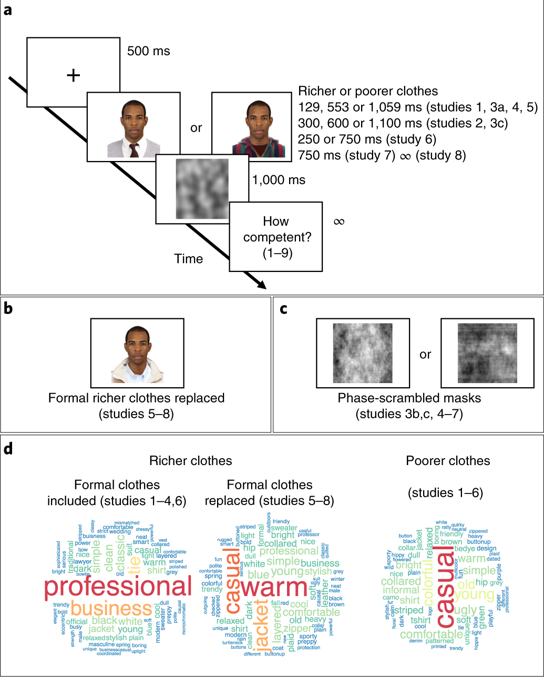Nature Human Behaviour ( IF 29.9 ) Pub Date : 2019-12-09 , DOI: 10.1038/s41562-019-0782-4 DongWon Oh , Eldar Shafir , Alexander Todorov

|
Impressions of competence from faces predict important real-world outcomes, including electoral success and chief executive officer selection. Presumed competence is associated with social status. Here we show that subtle economic status cues in clothes affect perceived competence from faces. In nine studies, people rated the competence of faces presented in frontal headshots. Faces were shown with different upper-body clothing rated by independent judges as looking ‘richer’ or ‘poorer’, although not notably perceived as such when explicitly described. The same face when seen with ‘richer’ clothes was judged significantly more competent than with ‘poorer’ clothes. The effect persisted even when perceivers were exposed to the stimuli briefly (129 ms), warned that clothing cues are non-informative and instructed to ignore the clothes (in one study, with considerable incentives). These findings demonstrate the uncontrollable effect of economic status cues on person perception. They add yet another hurdle to the challenges faced by low-status individuals.
中文翻译:

衣服的经济状况提示会影响面孔的感知能力
面孔对能力的印象预示着重要的现实结果,包括选举成功和首席执行官的chief选。假定的能力与社会地位有关。在这里,我们表明,服装中微妙的经济地位线索会影响人们从面孔上感知到的能力。在九项研究中,人们对额头爆头中所表现出的面孔的能力进行了评估。由独立法官将面孔显示为不同的上身衣服,看起来“比较富裕”或“较差”,尽管在进行明确描述时明显被认为是“富裕”或“较差”。与“较差”的衣服相比,用“更富裕”的衣服看同一张脸的能力要强得多。即使感知者短暂地受到刺激(129毫秒),警告服装提示没有提供任何信息,并指示他们忽略衣服,效果仍会持续(在一项研究中,并提供大量激励措施)。这些发现表明,经济地位线索对人的感知具有不可控制的作用。它们为地位低下的个人所面临的挑战又增加了一个障碍。


























 京公网安备 11010802027423号
京公网安备 11010802027423号